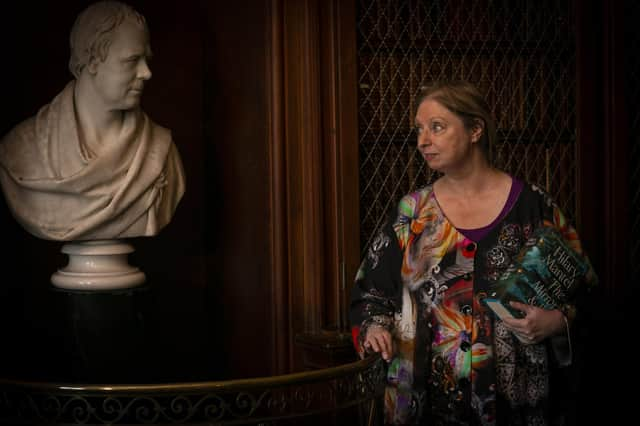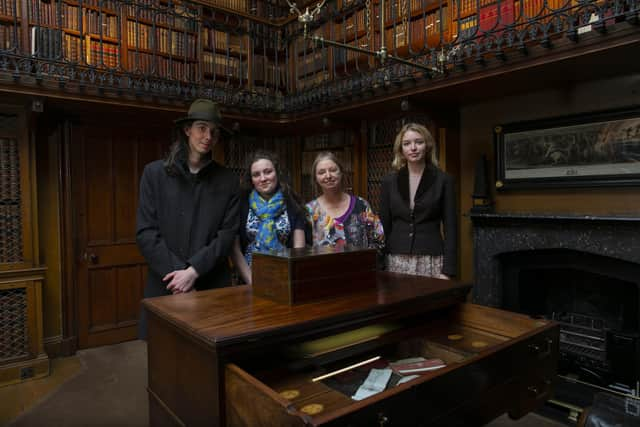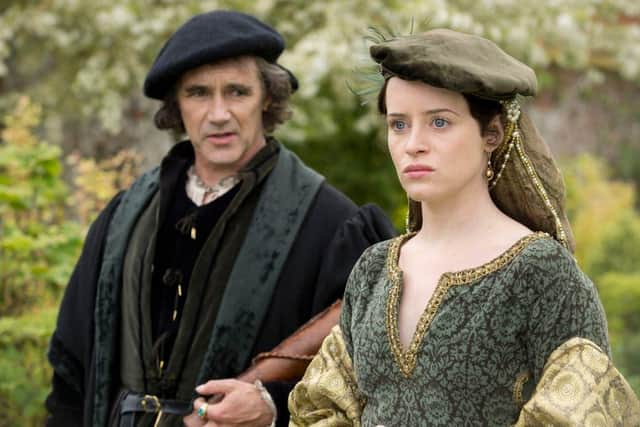Hilary Mantel shares her secrets of writing historical fiction


That was certainly the sense on a Saturday evening in early November in a marquee in the grounds of Sir Walter Scott’s home, Abbotsford, where a crowd gathered to see two-times Booker Prize winner – and now two-times Walter Scott Prize-winner – Dame Hilary Mantel, whose public appearances are rare, and all the more anticipated for it.
And as, in the words of veteran broadcaster James Naughtie who was chairing the event, “a Wagnerian storm” battered the festival site – even threatening to stall the whole event at one point – Hilary Mantel filed into the venue, calm, unassuming, and only as windswept as the rest of us. It seemed oddly fitting that the masterful author of such dark scenes as we witness in Wolf Hall (which won the inaugural Walter Scott Prize in 2012), Bring Up the Bodies, and now the final part of the trilogy based on the life of Thomas Cromwell, The Mirror and the Light, should arrive with a flourish of such meteorological drama.
Mantel was there to discuss with Naughtie the tradition of historical fiction, how she moved the genre forward with her decade of literary hits, and to try to predict what the future holds for it, as well as present The Young Walter Scott Prize.


Privately funded, as is the Walter Scott Prize, by the Duke and Duchess of Buccleuch, The Young Walter Scott Prize recognises budding writers of historical fiction – in all its forms – from the ages of 11 to 19. It’s now in its seventh year and going from strength to strength.
Mantel is passionate about supporting and encouraging burgeoning young talent, telling Naughtie: “When Wolf Hall came along, I do think it changed things, and changed the game for historical fiction. Now, writers and readers are seeing all the possibilities… taking risks with viewpoint and narrative form.”Citing Penelope Fitzgerald’s 1995 novel The Blue Flower as one of her biggest influences, Mantel believes young writers today have possibilities galore to play with, and should make the most of the work that has gone before, clearing the paths of convention.
Another literary heavyweight, Val McDermid, also attending the Festival with her novel 1979, agrees: “I wrote as a teenager, but mostly song lyrics and poetry. I wrote because I felt I had to. I wanted to find an audience, so I submitted it wherever I thought I might get it published, but mostly I was unsuccessful. Now, I could simply put it up online.”
“Don't take no for an answer”, she urged would-be young writers. “People will tell you you'll never make it, but don't listen to them. The more you write, the better you become.”


And this is certainly the advice taken by Atlas Weyland Eden, Ide Crawford and Madeleine Friedlein, whose stories won Young Walter Scott prizes in 2019 and 2020, and who were hosted at Bowhill – the Duke of Buccleuch’s estate – for the weekend, as they attended the Borders Book Festival, alongside other famed authors..
“My home’s always been a nurturing environment for my creativity,” said Eden, writer of prize-winning story We Wolves. “We have a woodland close at hand, where I walk my dog at dusk, imagining being two wolves on the hunt. The walk inspired the opening of We Wolves.
“For me, it comes down to shapeshifting. When writing We Wolves, I loved imaging myself into an animal, imagining being in a forest during the Upper Paleolithic era. I also love the craftsmanship of writing, and the feeling of bringing something to completion. Winning the prize means my writing can go out into the world and do strange and wonderful things.”For fellow winner Ide Crawford, who won the prize in 2019 for The Whale’s Way, and whose first novel is currently on submission with a publisher, writing historical fiction is an invaluable tool.
“Building round history and myths is a useful starting point, as they provide positive constraint. Otherwise the possibilities can sometimes feel bewildering or underdetermined, and cliche is, paradoxically, much more of a danger. The inventiveness of oral story-telling traditions, and the way that history, once you look into the detail, is often stranger than anything you could imagine – it’s humbling and exciting and eye-opening in terms of the range of stories you might be able to tell, but also gives you some clue about where to start.”
Mantel encourages her young prodigies to really aim to inhabit the era in which their writing is set. “Live in that world,” she says, “and this magic day comes and it becomes solid and real.”
“If you can get your five senses working for you, you are home and eventually your dreams will move to your chosen period as well.”McDermid agrees, but adds that writing historical fiction not only helps writers to learn how to research, it allows them to write about the present day in a way that’s “not direct”, making practicalities and legalities easier to navigate.
“You can write about the things that make you angry”, she adds. “The things you’re passionate about, a commentary on the here and now, but without having to deal with the harsh realities of the present day.”Of course, for these teenagers whom The Young Walter Scott Prize celebrates, one of the harsh realities of the present day is the Covid-19 pandemic and everything it has meant for them and their education.For Eden and Crawford, both homeschooled, the effect has been minimal – if anything, a silver lining of more material being available online as a matter of course. But Madeleine Friedlein, winner for her story Slaying Holofernes, feels differently.
“There was an absence to [online] learning,” she says. “I felt detached and struggled to engage with or enjoy any of my classes. Though we managed to keep up and now appreciate in-person lessons even more, my peers and I all agree that the things we learnt online are more difficult to recall now.”
And living through a pandemic has had more practical implications for her too. “I often hear something in lessons that sparks my interest and write down a name or quote on the back on my hand. Now I often lose these ideas after washing my hands!” she jokes.
But despite the many challenges, and almost two years after the pandemic brought the world to a standstill, Hilary Mantel and her fans were at last allowed to gather under the same tarpaulin roof, in the shadow of the home that nurtured the country’s greatest-ever storyteller, 250 years on from his birth.
James Naughtie said, after the evening had drawn to a close and the wind had subsided: “The association with Abbotsford and completing the journey that began with Wolf Hall, it gave the whole event a symmetry that I think moved everyone.”
It’s all about being in the room.
The winners of the Young Walter Scott Prize 2021 will be announced early in 2022 and presented with their awards at the Baillie Gifford Borders Book Festival in June next year. Submissions from publishers for the Walter Scott Prize 2022 are now welcomed. See www.walterscottprize.co.uk for details.
A message from the Editor
Thank you for reading this article. We're more reliant on your support than ever as the shift in consumer habits brought about by coronavirus impacts our advertisers. If you haven't already, please consider supporting our trusted, fact-checked journalism by taking out a digital subscription.
